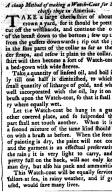[ A Cheap Method of Making a Watch-Coat for Soldiers, Chiefly those in America. ]
Date: 1767/08/20
Source:
Nova Scotia Gazette
Institution: Nova Scotia Archives
| Source Origin: Nova Scotia Newspapers on Microfilm
| Reference: Consult the Nova Scotia Archives' "Nova Scotia Newspapers on Microfilm" list (Royal Gazette) for a complete account of microfilm reels for this paper. EMMR includes recipes from reel 9466.
A set of instructions for coating fabric to make it waterproof. Vol. 2, No. 54. Microfilm Reel 9466.
A cheap Method of making a Watch-Coat for Soldiers,
chiefly those in America.
TAKE a large check shirt of about half a
crown a yard, for it should be pretty fine:
cut off the wristbands, and continue the opening
of the breast down to the bottom; sew up the sides
from the gussets downwards; rip out the gathers
in the fore parts of the collar as far as the shoul-
der straps, and resew it plain to the collar. The
shirt will then become a sort of Watch-coat, like
a bed-gown with wide sleeves.
Take a quantity of linseed oil, and boil it gent-
ly till one half is diminished, to which put a
small quantity of litharge of gold, and when it is
well incorporated with the oil, lay it on with a
brush upon the Watch-coat, so that it shall be eve-
ry where equally wet.
Let the Watch-coat be hung in a garret, or
other covered place, and so suspended that one
part shall not touch another. When it is dry a
a second mixture of the same kind should be laid
on with a brush as before. When the second coat
of painting is dry, the paint will not come off,
and the garment is an effectual preservative from
the rain; it is very light to carry, and being
pretty full on the back, will not only keep the
man dry, but also his pack and ammunition.
This Watch-coat will be equally serviceable to
sailors at sea, in rainy weather, and if generally
used, would save many lives.
Download: Transcription | Images
